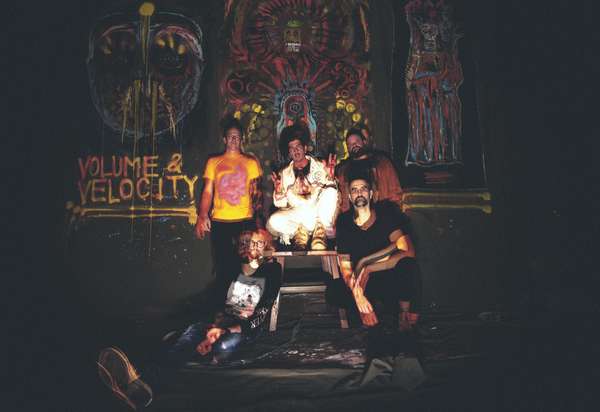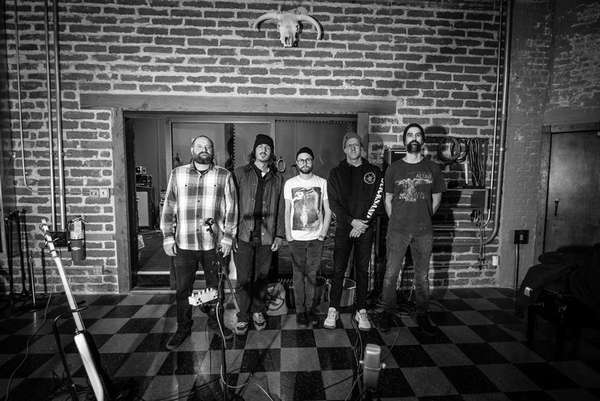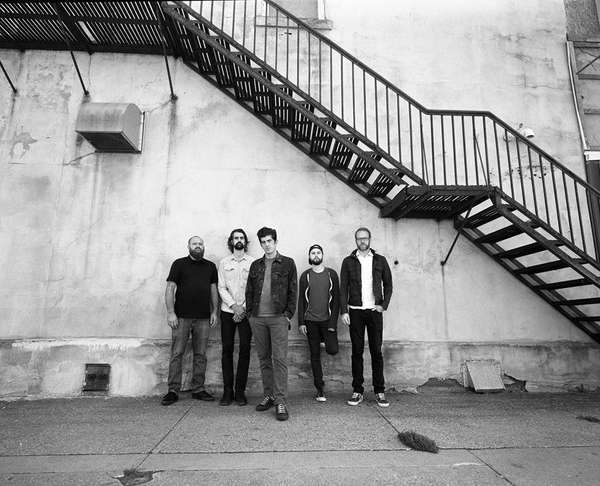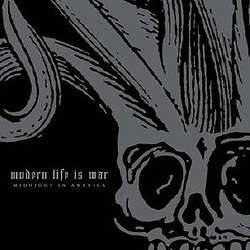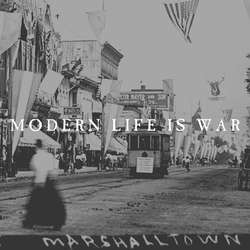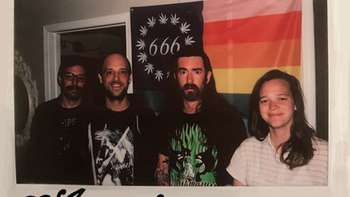
Scene Point Blank: Now I missed a lot of the press right at the release of the album, I actually got brain trauma, so I was out of it for a while, but I did get the album but couldn't listen to it until a month or two later. It seems like it's a punk rock summer album. Be young, stupid, and have fun.
Jeff Eaton: It's funny that you say that because that's what I told the band. "I don't want to write another record that you listen when your dog died and you're home on a snowy Tuesday night and you want to kill yourself. I want to write a record that you and your friends can pop in on Saturday night and just drive around in your car with nothing to do." I think a lot of people were surprised by that or resented the record for that reason.
Scene Point Blank: That was me. I wrote it off but recently I kept listening to it, and because I'm in that situation now, it's a good record for the summer. I don't have school so I work and have fun, drinking forties and being dumb.
Jeff Eaton: Another thing about it is that at point I felt like I said enough about the inner workings of my mind and the way I personally saw the world. I said I'm not doing that, and yes there is a little bit of that in there, it's an instinct, but it's not the focus. That's the thing I'm really proud about; I was able to write an album of lyrics that weren't steeped in depression and mental conflict, which is something I really wanted to do. I got to write a song about my dad [Motorcycle Boy Reigns], one about Jean Seberg; I got to do Stagger Lee. I'm really proud of it.
Scene Point Blank: You're first show was in Tyler's basement right?
Jeff Eaton: Yeah.
Scene Point Blank: Okay, from that that show to the last show how do you think you've changed?
Jeff Eaton: Me personally, or the band as a whole?
Scene Point Blank: Both. Start with you personally.
Jeff Eaton: One thing is that I feel like I get just as excited.
Scene Point Blank: Playing a show or excited about the band in general, everything about it?
Jeff Eaton: About playing, about coming to New York, playing a skate shop or a new place. I don't feel like I've become jaded or bitter about anything. But I've also learned a lot; I was very naïve when we first started the band because I didn't know people talk to you because you were in a band. It sounds stupid to say because I wasn't that young. That wasn't in the picture for me. I didn't understand it.
Scene Point Blank: You didn't understand it or you just didn't think about it?
Jeff Eaton: I guess I just didn't think about it. I learned that there are people out there who are like leeches and there are people out there who don't want to talk to you. There are people who want to talk to you because they want to be seen talking to you. I learned a lot about the music industry, pretty much all bad things. There are some good people that we've been fortunate enough to work with. I learned a lot about what it's like to live in other places and what people's lives are like. I learned a lot about myself. My eyes have been opened to a lot of things but I didn't want to be this guy who felt like a veteran who's seen it all. I think it's a horrible attitude.
Scene Point Blank: What about the band?
Jeff Eaton: I think we went on a musical journey of some sort, as corny as it sounds. I think we discovered new ways to write songs and make new sounds, ways to improve ideas we have and then act on them. The lyrics, I think, have always been going in a direction where they're trying to get somewhere. Along the way it took on a life of its own where Modern Life is War was something unlike what the five of us were. Other than that I think the spirit of the band was the same from when we started.
Scene Point Blank: You played the last two Explosion shows; did you feel the atmosphere of the live setting changes when the band or the crowd understands this may never happen again? Do you give it a different kind of energy?
Jeff Eaton: I see this as being the ideal vibe. The best nights are where things click into place between the crowd and the band and everyone really needs that music. I think everyone almost forces themselves into that mindset when it's coming down to the end like this. In some ways you could say that it's not pure, but I think it is. I cannot wait to play as hard as I can for people and the kids think, "This is the last time, we gotta go off." I don't think it's a different situation but it's ideal.
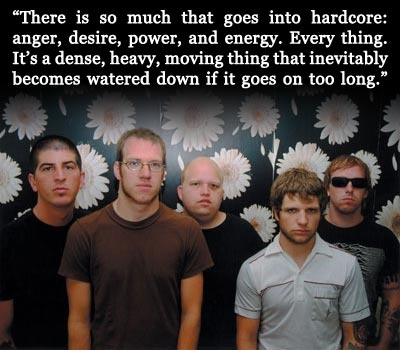
Scene Point Blank: Over the last few years bands have made more of a practice of reuniting; Last night CIV did a reunion and Earth Crisis is on the road now doing another reunion. What are your thoughts on reunion shows? Do you think Marshalltown will really be the last show for Modern Life is War?
Jeff Eaton: I think it's situational. I can't speak for those people; maybe it's for the passion and the songs they miss so much. I can't say that is necessarily true. From my perspective it might be for the money, and that does cheapen the experience. Those bands belong in a time and a place and they should be left there. Holding On is playing our last show and when they played our first show they were a big inspirational factor for me to do this band. They're getting back together because they love us and they're proud us. They're not going to make much money. I called them and asked them and I'm really glad they're doing this for us. Again it really depends on the situation.
I feel really strong that April 26th will be the last Modern Life is War show and I think everyone in the band feels the same. One reason I ended the band is that I felt like we did what we needed to do and we had a time and place which is no longer there. I don't see us ever playing again and I could easily eat my words, but right now I'm confident.
Scene Point Blank: You said you said what you have to say and did what you have to do; right before Midnight in America was released you switched from Deathwish to Equal Vision saying that you believed you could reach a larger audience with the switch. Do you think you did that? Do you think you accomplished what you wanted to do?
Jeff Eaton: I think so. I never felt too comfortable on Deathwish even though I was really excited moving to that label. It seemed that people felt it reflected back on us as a band more than we wanted it to.
Scene Point Blank: Your band mentality?
Jeff Eaton: Right, people were thinking, "You're a Deathwish band." I didn't want that to mean anything. I wanted it to mean they happened to put out our record and that's all. We got lumped in with all these other Deathwish bands and our target audience became assumed. I hated that. I wanted to say that our target audience is anyone who happens to hear us and likes what we do. Looking back on it, and I didn't think of this at the time, it's almost like a symbolic thing to me. We said, "Modern Life is War does not belong to anyone. It doesn't belong to hardcore or Deathwish or anything." We're just a band and we play music. The scene we came up in did everything for us. I love the scene we came up in for so many reasons. There are reasons I don't like it but the same is true for anything. I'm glad we made the move and I'm glad there are kids in the hardcore scene with a stick up their ass about it, thinking a label ruined our band. If that has anything to do with the way you think about us or how you feel about our music, then it's good you know that we don't care about those things. I want to make it clear that those things don't matter to us.
Scene Point Blank: It's interesting when you talk about label association because in the early nineties labels had sounds equated with them, there were Lookout sounding bands or Fat and Epitaph sounding bands, but if you think about one that endured, it was Jawbreaker. And they were always on these obscure labels until their last album. It had nothing to do with their sound. What were some of things you didn't expect to happen but did as a result of Modern Life is War? Where did it take you that you didn't necessarily expect to go?
Jeff Eaton: If we're talking from the get go; I didn't expect anything. I thought that we going to go out on a first tour and people would take a look at us and think, "These guys don't belong here. They're not this enough or they're not that enough." We thought we'd tour and just go back home. I liked some of the music going on but I wasn't really aware of the scene. I'd never been to an actual hardcore show. I've been to shows in Iowa, but we didn't have a hardcore scene. There was never a show where the line-up was exclusively hardcore bands. I didn't know what to expect from that and thought we'd get shutdown; I didn't anticipate everything going the way it did. It's still shocking to this day.
Scene Point Blank: I missed a lot of the initial press and impact of Midnight in America due to medical reasons but I remember you did some touring and I was going down to Florida to cover The Fest and the day of you cancelled the show. From there the rest of the tour was cancelled and things were quiet until the news broke that the band was breaking up. I recall at the time of The Fest, a family member had become ill; did that event have anything to do with the band's conclusion?
Jeff Eaton: Those tours did; it wasn't anything specific that happened on those tours. It was a point where money was becoming a real stress and we did a lot of touring right then. We didn't make it to The Fest because my grandmother became ill and had a few days to live. I had to get home right then. At that time Harm said, "I love you guys and I'm having a good time but I miss my friends and my girl; I miss my family and I don't know what's going on with the band right now so I going home." Tim was planning on going back to Jersey after that tour because he couldn't take living in Iowa anymore. At that point it was just John, Tyler, and I. The record had just come out and we toured all of America on it and we felt proud of it but didn't have any kind of vision as to what the next album would be. I don't want to say things fell apart, but we all had the feeling that this would be it.
Scene Point Blank: My friends asked me how I felt upon hearing the news of your break up because I said Witness was the album I'd waited my entire life to hear. I told them I was glad and it marked the end of an era. They still don't understand. Do you think the nature of punk, maybe hardcore punk to be specific, has something to do with brevity; the idea of short, fast, loud?
Jeff Eaton: There is so much that goes into it: anger, desire, power, and energy. Every thing. It's a dense, heavy, moving thing that inevitably becomes watered down if it goes on too long. It's becomes a money thing or a ghost of itself. It becomes a job. I knew we were there and rather than doing a last Euro tour or a last Japan tour I said, "One more tour, three weeks long, last show in Marshalltown and we're done." I started to feel that really strongly.
Scene Point Blank: Do any of the other members have bands lined up?
Jeff Eaton: I know everyone is going to do more music, but I think they're still figuring out the sound.
Scene Point Blank: I'm just making this conclusion now but I read "On the Road" after my first year of college, after a drastic life change and it was something I needed to hear, but then you live that lifestyle and it seems romanticized. It's not that it sucks, but you see the hardships. It wasn't only the beats but they get the notoriety for it, them and Bukowski. Being in a band and having read those authors do you think they romanticized it or the reader romanticize it or perhaps the whole notion in general?
Jeff Eaton: I think the authors romanticized it.
Scene Point Blank: Did you ever read Big Sur?
Jeff Eaton: Yeah.
Scene Point Blank: You see Kerouac in those novels and he's drastically different. In the end there he is a fucking mess. Genius but damaged, which is something you touch on in your lyrics. You can appreciate it but to really understand their lives you have to get a whole new understanding of beauty.
Jeff Eaton: You have to understand that there is a huge price to pay. I think the authors knew they were romanticizing but they also knew there was a heavy tag that comes along with creating that body of work. There is a book by William Gaddis called "The Recognitions" with a quote that's amazing. "What's left of a man after the work is done but human shambles that fell to the ground." When I look back at the band sometimes I wish never did an interview. People will come to you wanting more. What's there is there; you're not going to get anything deeper or more meaningful out of me. You do the work and just a regular person caught up with just as much as everyone else who love the band. I don't have a better way of how to cope with those things. I'm not any better than anyone who has the problem; the work is the work and I'm just as big of a mess. I'm just as much a hero or a piece of shit as everyone else. I don't know how to put it into words, but don't look to those people for anything more than what they already gave you. They have nothing more to offer you.
Scene Point Blank: The line I always think of when I think about Modern Life is War because it says something I feel constantly. "I'm all homesick for endless, broken white lines." Do you think you'll always be hungry for the road?
Jeff Eaton: That's the scariest thing for me right now, ending this band. I don't feel like I can hold down a job or advance within. I don't even think I could compete for a good job.
Scene Point Blank: Don't think you could or don't care?
Jeff Eaton: I know I could do it, but I don't care enough to do it. Even if I could convince myself, it's only going to last so long. At some point I'm going to freak out. Right now I don't have any money, I'm in the red. I have to get a job and figure out what to do with my life. Modern Life is War is my ticket to go around the world, without losing too much money and I'm throwing that in the garbage now. I'm scared to death because I know I'm not ready to live a normal life, whatever that means. I have to start scheming and planning because I can't do that long-term life right now. I still feel that way exactly and it sucks.
Words: Scottie | Graphics: Matt | Photos courtesy of Ian McNemar and Alex Gibbs
- Modern Life is War Myspace: http://www.myspace.com/modernlifeiswar | Equal Vision Records Website: http://www.equalvision.com
- SPB's earlier interview with Jeff
